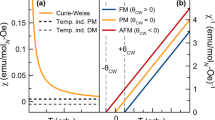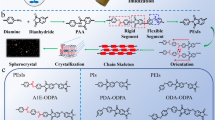Abstract
ALTHOUGH the dielectric loss peaks in many materials are known to show a frequency dependence which departs radically from the ideal Debye shape, the interpretation of their temperature dependence is carried out implicitly within the framework of the Debye mechanism. This cannot produce a good physical insight into the situation and here I look at it from a new standpoint.
This is a preview of subscription content, access via your institution
Access options
Subscribe to this journal
Receive 51 print issues and online access
$199.00 per year
only $3.90 per issue
Buy this article
- Purchase on Springer Link
- Instant access to full article PDF
Prices may be subject to local taxes which are calculated during checkout
Similar content being viewed by others
References
Jonscher, A. K., Nature, 253, 717–719 (1975).
Jonscher, A. K., Colloid Polym. Sci., 253, 231–250 (1975).
Jonscher, A. K., in Dielectric Materials, Measurements and Applications, 87–90 (IEE Conference Publication No. 129, 1975).
McCrum, N., Read, B. E., and Williams, G., Anelastic and Dielectric Effects in Polymeric Solids (Wiley, New York, 1967).
Lauritzen, J. I., J. chem. Phys., 28, 118 (1958).
Stoll, B., Pechhold, W., and Blazenbrey, S., Kolloid-Z. Z. Polymere, 250, 1,111–1,130, (1972).
Author information
Authors and Affiliations
Rights and permissions
About this article
Cite this article
JONSCHER, A. New interpretation of dielectric loss peaks. Nature 256, 566–568 (1975). https://doi.org/10.1038/256566a0
Received:
Accepted:
Issue Date:
DOI: https://doi.org/10.1038/256566a0
This article is cited by
-
Preparation and characterization of Zn-modified CaBi4Ti4O15 piezoelectric ceramics with lower sintering temperature
Journal of Materials Science: Materials in Electronics (2020)
-
Why the dipolar response in dielectrics and spin-glasses is unavoidably universal
Scientific Reports (2016)
-
Acoustic measurements of possible polaron relaxations in YBCO
Il Nuovo Cimento D (1997)
-
Dielectric properties of chemically vapour-deposited Si3N4
Journal of Materials Science (1989)
-
Thermally stimulated depolarization currents in PVDF-α: a dipolar interaction approach toβ andγ transitions
Journal of Materials Science (1987)
Comments
By submitting a comment you agree to abide by our Terms and Community Guidelines. If you find something abusive or that does not comply with our terms or guidelines please flag it as inappropriate.



